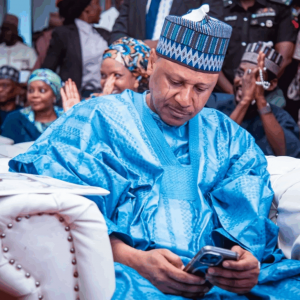The African Democratic Congress (ADC) is facing a leadership crisis following allegations by a prominent chieftain, Salihu Lukman, who accused the party’s interim leadership of godfatherism and plots to impose candidates ahead of the 2027 general elections.
Lukman, a former National Vice Chairman (North West) of the All Progressives Congress (APC) and ex-Director General of the Progressive Governors Forum (PGF), made the allegations in a statement titled “ADC and the Prospect of Internal Democracy” released on Tuesday.
The ADC, recently repositioned as a “third force”, was adopted by a coalition of opposition leaders—including former Vice President Atiku Abubakar; ex-Kaduna Governor Nasir El-Rufai; ex-Rivers Governor Rotimi Amaechi; and other political heavyweights—as a common platform to challenge the ruling APC in the 2027 polls.

As part of the merger arrangement, former Senate President David Mark was appointed interim national chairman, while former Interior Minister Rauf Aregbesola was named interim national secretary.
ADC risks becoming like old parties
Lukman warned that unless urgent steps were taken to guarantee internal democracy, the ADC could quickly descend into the same crisis-prone structure it seeks to replace.
“The truth is that the negative side of almost all our opposition political leaders is already at play,” Lukman said.
“Many are taking steps to manipulate the process of leadership reformation of the ADC. Loyalists are being promoted in a manner that suggests perhaps the 2027 elections are already won.”
He accused coalition leaders of undermining the agreed zoning formula for national leadership positions, effectively positioning themselves as “zonal overlords”.
“When the national leadership positions of ADC were shared among zones, the coalition leaders—who were merely nominees in the committee that negotiated the arrangement—promoted themselves to become the leaders of their respective zones,” Lukman said.
According to him, this emerging trend could lead to imposition of candidates across the board, sidelining merit, competence, and public trust.
Call for reform and transparency
“The struggle to ensure that loyalists of leaders emerge as leaders of the reformed ADC to some extent disregards the consideration for intellectual capacity, integrity, performance track records, name recognition across all demographics, respect in community and political circles, independent-mindedness, and general acceptability to all or the majority of stakeholders,” Lukman stated.
“We must caution our leaders—Nigerians will not be deceived by any cosmetic design of presenting another party, which is only a duplicated copy of our old parties.”
He challenged Senator David Mark’s interim leadership to prove its credibility by resisting undue influence and ensuring a transparent, merit-based internal selection process.
“The first test of Senator Mark’s leadership of the party is the extent to which he can mitigate all these and ensure that ADC is not a party controlled by godfathers. Coalition leaders must not impose surrogates as candidates across the board,” he added.
The ADC has yet to officially respond to Lukman’s allegations.
About the ADC “Third Force”
The African Democratic Congress emerged in recent months as a coalition platform for opposition leaders seeking to challenge the dominance of the ruling All Progressives Congress (APC) and the main opposition Peoples Democratic Party (PDP) in the 2027 general elections.
Key political figures such as former Vice President Atiku Abubakar, former governors Nasir El-Rufai and Rotimi Amaechi, and other notable politicians from across party lines adopted the ADC to present what they describe as a “credible alternative” to Nigerians.
The coalition pledged internal democracy, inclusiveness, and people-centred leadership as core values distinguishing it from the country’s established political parties.
Political commentators have described the ADC’s expansion as one of the most significant opposition realignments since 2015. However, Lukman’s warning underscores fears that the coalition could mirror the practices of old parties it aims to replace.
Stay ahead with the latest updates!
Join The Podium Media on WhatsApp for real-time news alerts, breaking stories, and exclusive content delivered straight to your phone. Don’t miss a headline — subscribe now!
Chat with Us on WhatsApp







